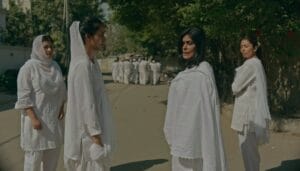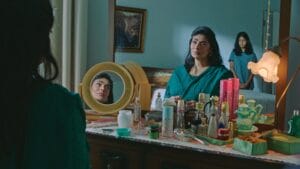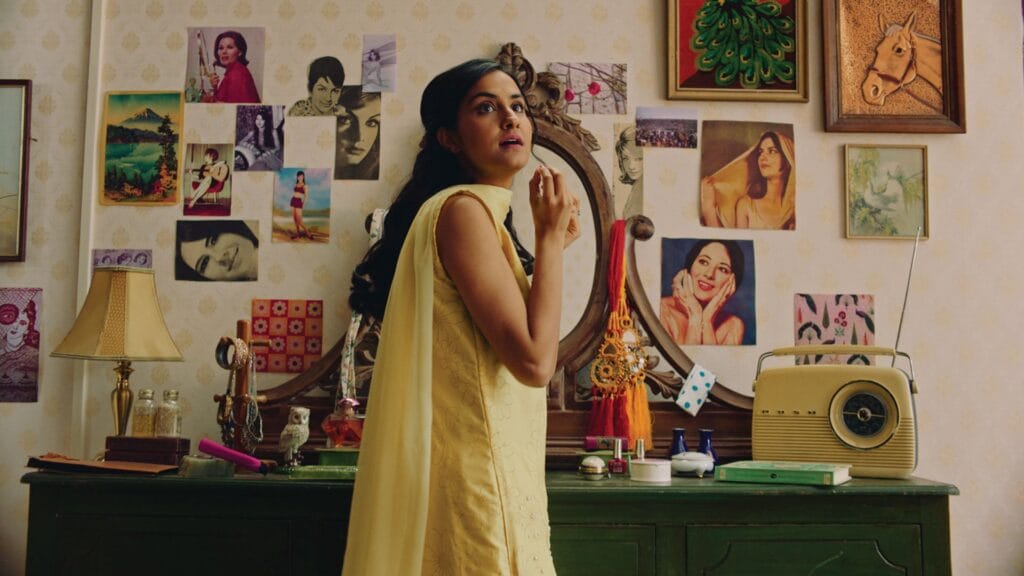For fans of LGBTQ cinema, Queer Rhapsody is the place for you! Queer Rhapsody is a Los Angeles based film festival taking place July 19th – 28th, organized by the UCLA Film & Television Archive. The festival centers the joy, healing, and narrative reinvention of contemporary LGBTQIA+ cinema.
Screening Sunday, July 28th at the American Cinematheque’s Egyptian Theatre in LA, The Queen of My Dreams tells the story of queer Pakistani grad student Azra. She is worlds apart from her conservative Muslim mother when her father suddenly dies on a trip home to Pakistan. Azra finds herself on a Bollywood-inspired journey through memories, both real and imagined; from her mother’s youth in Karachi to her own coming-of-age in rural Canada.

The screening will be followed by a Q&A session with producer Andria Wilson Mirza and writer/director Fawzia Mirza. The award winning Fawzia Mirza spoke with GLAAD’s Allison Bloom to talk about The Queen of My Dreams and authentic representation in film.
“This film has its roots in my first short film, which I made in 2012 before I knew I was a filmmaker,” Mirza begins. “I was wrestling with if I could be queer and Muslim, and still love Bollywood romance, and started exploring that through art and trying to make a video piece that could be a gallery installation,” they explain. “A filmmaker friend at the time said to me – I think this could be a movie.”

Mirza knew from the start, this project was very special. “Making that film, and sharing it at film festivals, saved my life.” They continue, “The Queen of My Dreams is a result of that 10+ year journey of reconciling my identities. Because there is so little representation of queer and trans Muslim people, I felt like I had no choice but to tell this story.” Little did they know, the film would go on to recieve five Canadian Screen Award nominations, be shortlisted for the 2023 Jean-Marc Vallée DGC Discovery Award, and be named one of TIFF’s annual Canada’s Top Ten list.
She talks about what it would have meant to her when they were younger, to have had a film like this to look up to. “Maybe I wouldn’t have even become a filmmaker! I feel like so much of my journey was about creating that representation, because there was literally none. I think that lack of visibility contributed to me coming out as queer later in life, to coming out as an artist later in life – because I just didn’t know I could exist as my whole self.”

She has been so moved by audience’s responses to the film. “This is a movie that centers love, and it’s about how we become who we are. It’s about learning that we are not just an ‘I,’ we are a WE that is connected to community through relationship and history.” They continue by sharing, “I love love, and I crave deep connection – so when audiences have told me that they were laughing and crying at the same time while watching the movie, that’s my dream!”
They discuss the importance of not only providing representation for LGBTQ Muslims, but doing it in an authentic way. “When I think of authenticity, I think it means you have to know who you are, in order to understand your characters and their relationships. I’ve had to work to build that love and understanding for myself and all aspects of my identity.” They say, “With this film, I think the authenticity is connected to that embracing of identity and letting go of shame – not feeling embarrassed or ashamed of aspects of who I am, of my culture or where I come from, of my struggle or my mothers’ – being able to truthfully represent those attributes without applying my own judgement.”
The Queen of My Dreams features a few poignant scenes in 1969 with a character named Rani, played by trans actress Zara Usman. Mirza talks about the importance of Usman’s role, ‘The character that she plays, Rani (which means Queen) is an aspirational character, a nod to the fact that trans people have existed in all moments in history.”
The film includes countless nods to classic Bollywood films, such as Amrit Kaur playing both Azra, and her mother when she was her age. Mirza expands a bit on this, saying, “As I was thinking about the two roles, that’s when it hit me – the film hinges on the mother in her youth and the daughter in the present being so similar, there was this this opportunity to actually literalize that, and show that the mother IS the daughter. Doubling is a common device in Bollywood films, including the famous 1969 film Aradhana that is referenced in this movie, and when I pitched it to my producers they were fully on board. This obviously presented a huge opportunity, but also a huge challenge, for the actor who was going to take on these two roles. But Amrit Kaur nailed it (and recently won a Canadian Screen Award for her work!).”
View this post on Instagram
Mirza spoke about their excitement to be screening this award winning film at Queer Rhapsody this weekend. “My mission as a filmmaker is to center love, joy, hope, community and collaboration through my work. Queer Rhapsody is centered around those same values and it means so much for us to have our first LA screening as the closing of the series. Film festivals, especially LGBTQ film festivals, gave me community, supported me and made me feel like I had a voice and it mattered before anyone else did. I wouldn’t have this career without them.”
Get tickets to see The Queen of My Dreams at Queer Rhapsody here.













